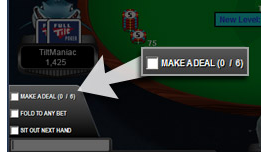Final Table Deals Are Useful In Online Poker Tournaments
– As Long As You Avoid These 'Chopping' Mistakes
 When you reach the final table of an online poker tournament, you will often be looking at enough money to make a big difference to your poker bankroll. The difference between first and second can be thousands of dollars alone, and the jump from 4th to 1st massive… and a coin-flip or cooler can make the difference between the big money and a consolation prize.
When you reach the final table of an online poker tournament, you will often be looking at enough money to make a big difference to your poker bankroll. The difference between first and second can be thousands of dollars alone, and the jump from 4th to 1st massive… and a coin-flip or cooler can make the difference between the big money and a consolation prize.
To smooth out the swings, it is common nowadays for players to agree to a deal or ‘chop’. This splits up the prizes, making sure everyone has a fair share. Sometimes the final table deal ends the game, other times you might play for a smaller prize or ‘bragging rights’ for coming first.
Making that final table deal can be tricky – and this article explains some of the key factors involved in ensuring that you get your fair share of the money. I start with the question of when to make a deal. Next I have covered the sites which allow this and the risks of private deals at those who do not. After this the different categories of deal possible, including ICM deals, chip-chops and the factors involved in custom deals. At the end, some words on negotiation – how to be firm yet fair and the importance of negotiating in good faith.
When To Make A Final Table Deal In An Online Poker Tournaments?
You can propose a deal in virtually any poker tournament, though the bigger the prize money the more likely you will find the other players agreeing. I have had offers to chop in 5 table Sit N Goes before – so this is my no means something for the Sunday Majors only.
Opinions differ on the ideal amount of players to chop the prize pool with. This could be a full table, or it could be the last 2 players only. If any one player does not want to make a deal, then this can’t go ahead – so you are at least playing until that person is eliminated…
In my experience the best time is between 2 and 4 players, and when the chip-stacks are relatively even. If the stacks are ‘shallow’ compared to the blinds then the role of chance in who gets the prizes is larger – meaning you should be more willing to consider a deal. When one player has a big chip lead they will often (rightly) assume that a deal will not be in their interests, since they can use the prize jumps to ‘bully’ everyone else. Likewise, people often wait until the smallest stacks have busted out before offering that chop.
Finally, at sites without official support for final table deals you have to rely on trust for the money transfers between players… The more people involved the greater chance that you will find a dishonest player who will try and steal your cash!
Planet Mark’s Rec: America’s Cardroom are crushing it for online poker tournament events that welcome both US and worldwide players. ‘The Venom’ tops the list, add to this the popular OSS events, PKO games and a packed regular schedule with guarantees that are growing all the time.
Best of all, you can get your bankroll off to a flying start with a huge 100% welcome deal using referral code SNGPLANET.
Check out the latest promos and tournament events for yourself now at www.americascardroom.eu!
Which Sites Support Final Table Deal Making?
There are 3 major sites with official support for final table chops, these are PokerStars, Party Poker and Full Tilt Poker – Party and FTP have a built-in system to help you automate this, while Stars do this with their excellent support staff.
 PokerStars: You need to write to support@pokerstars.com with ‘‘URGENT Tournament #1234567‘ in the subject line to initiate a deal. A support rep will come, make sure everyone is agreed to making a deal, then stop the tournament clock while the deal is made and distribute the prize money. Some tournaments specify an amount must be left over for 1st place – for example the Sunday Million requires $30,000 be left out of any deal and played for!
PokerStars: You need to write to support@pokerstars.com with ‘‘URGENT Tournament #1234567‘ in the subject line to initiate a deal. A support rep will come, make sure everyone is agreed to making a deal, then stop the tournament clock while the deal is made and distribute the prize money. Some tournaments specify an amount must be left over for 1st place – for example the Sunday Million requires $30,000 be left out of any deal and played for!
Full Tilt Poker: Have an automated system where you can see how many people agree, if everyone is ok then the following screen pops up with different options to make a deal. You can hand control of the administration for the chop to whoever wants to do it, but everyone needs to agree.
Party Poker: Again an automated system which allows you to see how many people would be willing to make a deal, then kicks into action when all of the players have agreed.
Warning – Other Sites Are At Your Own Risk!
At other sites you could agree a deal, then shove all in each hand and distribute the money via player transfers when the game has finished. This relies on trust and should not be taken lightly. If someone fails to transfer your $10,000 you will have no recourse either through the sites or legally. It is possible to chop these games with known ‘regulars’, but remember you are taking a risk with your money.
Final Table Deal Making – The Different Types Of Chop Available
There are three main variations for final table chops. These are chip count deals, ICM based deals and custom deals.
Chip Based Deals: This is easy, take the total chips and divide the total prize money accordingly. For example if player A has 5000 chips, player b 4000 chips and player c 1000 chips and the prize pool was $25,000 in total. Then the spit would be 25000/1000 = $2.50c per chip – or $12,500 for A, $10,000 for B and $2,500 for C.
ICM Based Deals: The Independent Chip model is a way of recognizing that chips change value in tournaments. An extreme way of looking at this is to take a game with 3 players left and a prize pool of $1000 / $500 / $300 for the remaining 3 places. Say player 3 had just 1 chip… doing a chip-chop would give him hardly anything, yet he is already guaranteed 3rd place (and poker miracles could happen to get him 2nd!). So that chip is worth at least $300! I explain ICM in a lot more detail in this article here. The ICM chop will give different outcomes to the chip chop. This will generally give more of the prize pool to the smaller stacks than the pure chip-count chop would –especially where there is one person who has a huge chip lead.
Custom Deals: Most deals will be customized in some way, for example an even split of the money when the stacks are 55% / 45% or a little extra for the short stack. You need to take skill into account in some way when making a deal, and acknowledging a pro at the table (especially when deep stacked ) with more money is common. For example, there is you, me and Phil Ivey sat with identical stacks at the end of a tournament – it would not make sense to split evenly, since Phil would have such a huge edge (of course he would not split, I am just making a point!).
Negotiation In Final Table Deals – Firm But Fair
If someone has a good reason to split the deal differently to chips or ICM then you have to negotiate. While some people like to ‘push hard’ this can actually be counter-productive, it only takes one player to decide that the deal is not right for them and the whole thing falls apart.
Like in any negotiation, you need to be prepared to walk away if you do not get what you want – so decide in advance how badly you want the deal to go ahead. The best deals leave every player feeling like they ‘won’, so make your point, push for the maximum you can get – but remember that the deal will only go ahead when everyone is happy.
Related Articles:
-
Players looking to build tournament experience and their bankroll at the same time really can not go wrong with the awesome PokerStars 180 Player Sit N Goes.
-
For those wanting to compare tournament sites on criteria other than the possibility of making a deal, you can start with this article on the Best Poker Site For Tournaments
-
If you are from the US, you can compare the games available across different buy-in levels in my US Online Poker Tournaments guide

